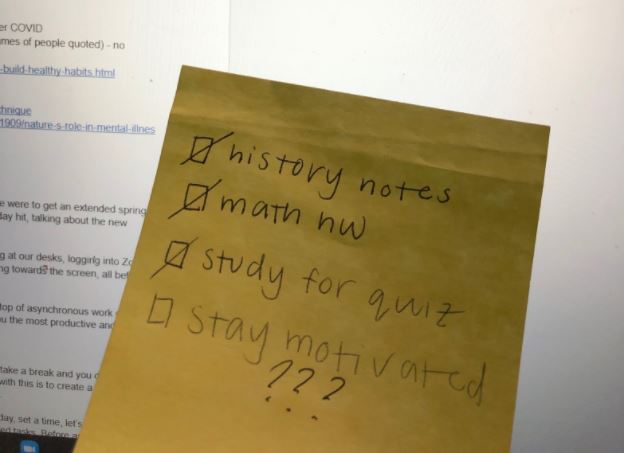Last March, I remember thinking about how excited we were to get an extended spring break, eagerly chatting about what we’d do once that last Friday hit, talking about the new coronavirus as if it was just another flu.
Fast forward nine months later and here we are: sitting at our desks, logging into Zoom yet again for another five to six hours of classes, eyes straining towards the screen, all before getting started on a mountain of homework.
Although the fatigue of Zooming five days a week on top of asynchronous work can be challenging, there are a few ways to help in order to make you the most productive and happiest version of yourself you can be (under these circumstances).
1) Set a schedule.
It can seem like there’s never a time where you can actually take a break and you don’t know when to stop doing homework or studying. One way to help with this is to create a schedule in which you have set times assigned to certain activities/tasks.
For example, instead of doing homework all throughout the day, set a time, let’s say 4pm-7pm where you devote as much effort as you can for school-related tasks. Before and after that time, use it differently in a non-academic way. It helps turn the endlessly unstructured day into more-manageable blocks.
Our editor Jewel Rubright swears by this as well. Balancing work, school, and life can be pretty difficult, so she has a daily routine in which she allocates different parts of her day towards different tasks. That way, she can complete everything she needs to do without wasting time!
2) Physical separation
Our minds create mental associations with our physical surroundings, as stated by a Harvard article. You can make a separation between home and school by doing schoolwork and other related activities somewhere where you won’t spend leisure time.
Although most of us do not have the luxury of a different office space, simply moving from the bed to a desk or even the floor will help strengthen your mind’s association between school and the desk and sleep with the bed instead of muddling the lines between the two, which may cause worse sleep.
3) Limit distractions
To create a productive atmosphere, it is important to limit distractions in order to get the most work done. It also helps reinforce the breaks between school and home life. Although it’s tempting to be on your phone during Zoom, try to limit it and especially during homework time in order to make time to actually use it.
Creating a distraction-free environment also means closing the door, asking your parents to not interrupt your homework time, doing chores ahead of time in order to reduce the things you need to do, etc.
4) Take breaks!
Although this might seem counterintuitive, taking breaks actually helps with productivity as your brain can burn out over time.
One such technique is the Pomodoro Timer. According to an article by Todoist, it’s a system in which you work on your tasks in 25 minute chunks and taking a 5 minute break in between. Every 4 chunks, you’ll want to take a longer (15-20 minute) break. You could use your breaks to stretch, check your text messages, grab a snack, etc. The breaks allow you to rest while being short enough to keep you focused.
5) Go outside!
Being cooped up in your room all day is unhealthy for you and, especially in a pandemic, we no longer have the ability to bask in the sun between classes or get a little spring in our step while walking to English. According to an article published by Harvard Medical School, spending time in nature can lower activity levels in the prefrontal cortex (which is associated with negative thought patterns). It also lowers blood pressure and levels of cortisol (which is very appropriately considered the stress hormone).
It might be difficult to get outside sometimes, though, especially if you live in a more crowded area. Images of nature and sounds (such as white noise) can have a calming effect so even if you don’t have a national park in your backyard, these can act as a great alternative. Whether that means setting a photo of a forest as your background, substituting your jams for the sounds of the ocean, or sitting in your backyard doing homework, doing so will have a positive impact on your mental health.



